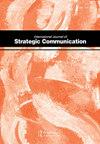错误信息重复更正对组织信任的影响:多多益善
IF 1.9
Q1 COMMUNICATION
International Journal of Strategic Communication
Pub Date : 2022-12-22
DOI:10.1080/1553118X.2022.2135098
引用次数: 0
摘要
错误信息正成为企业面临的一个日益严重的问题。因此,组织决定如何应对虚假或不准确的信息和“假新闻”是很重要的,因为它可能会损害公众对组织的看法。在决定如何应对时,组织还必须考虑纠正和整改的频率。在这里,我们认为,发布更频繁的纠正对组织的可信度既有积极的影响,也有消极的影响。通过实验设计,我们发现了重复修正引起的两种抵消效应。虽然高频率的纠正直接增加了组织信任,但说服知识和抗拒的负向间接影响降低了组织信任。在对错误信息进行一次纠正的情况下,这些负面的间接效应不会发生,而对组织信任的正面直接效应占据主导地位。因此,这项研究为组织提供了重要的见解。首先,调查结果强调组织需要对错误信息做出回应,以保持公众对他们的看法,其次,错误信息的纠正不应该被大量使用,而应该以一种深思熟虑和有目的的方式使用。本文章由计算机程序翻译,如有差异,请以英文原文为准。
Effects of Repeated Corrections of Misinformation on Organizational Trust: More is Not Always Better
ABSTRACT Misinformation is becoming an increasing problem for organizations. Therefore, it is important for organizations to decide how to react to false or inaccurate information and “fake news,” as it can potentially harm the public’s perception of organizations. In deciding how to react, organizations must also consider the frequency of corrections and rectifications. Here we argue that issuing more frequent corrections has both positive and negative effects on the perception of an organization’s trustworthiness. Using an experimental design, we uncover two counteracting effects evoked by repeated corrections. Although a high frequency of corrections directly increases organizational trust, the negative indirect effects of persuasion knowledge and reactance decrease organizational trust. In the case of a single correction of misinformation, these negative indirect effects do not occur and the positive direct effect on organizational trust prevails. This study therefore provides important insights for organizations. First, the findings emphasize the need for organizations to respond to misinformation to maintain the public’s perception of them, and second, corrections of misinformation should not be used to a great extent, but rather in a thoughtful and purposeful manner.
求助全文
通过发布文献求助,成功后即可免费获取论文全文。
去求助
来源期刊

International Journal of Strategic Communication
Social Sciences-Sociology and Political Science
CiteScore
3.40
自引率
0.00%
发文量
39
期刊介绍:
The International Journal of Strategic Communication examines the philosophical, theoretical, and applied nature of strategic communication, which is “the purposeful use of communication by an organization to fulfill its mission.” IJSC provides a foundation for the study of strategic communication from diverse disciplines, including corporate and managerial communication, organizational communication, public relations, marketing communication, advertising, political and health communication, social marketing, international relations, public diplomacy, and other specialized communication areas. The IJSC is the singular forum for multidisciplinary inquiry of this nature.
 求助内容:
求助内容: 应助结果提醒方式:
应助结果提醒方式:


